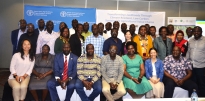
More than 140,000 smallholder farmers from Nyanza and Western Kenya are set to benefit from a Sh6.5 billion climate resilience project aimed at transforming agriculture across the Lake Region Economic Bloc.
The six-year initiative seeks to build adaptive capacity among farmers while promoting low-carbon, climate-smart agricultural value chains.
The initiative, titled ‘Transforming livelihoods through climate resilient, low carbon, sustainable agricultural value chains in the Lake Region Economic Bloc,’ is financed by the Green Climate Fund with additional support from the government of Denmark, the Food and Agriculture Organization and the government of Kenya.
At a two-day inception workshop in Kisumu, Hamisi Williams, FAO’s assistant representative in Kenya (programmes), said the project will adopt a locally led approach to transform agricultural value chains into climate-resilient and low-emission pathways.
“The project proposes a set of practices designed to improve farmers’ adaptive capacity by making key resources and social safety nets more accessible. This is aimed at preventing losses and sustainably increasing productivity to enhance resilience to climate change,” Williams said.
The project will target six priority value chains: dairy, poultry, coffee, tea, fruit trees and African leafy vegetables.
It will support technology transfer and scaling of adaptation and mitigation practices across production, harvesting, processing and marketing stages.
He added that the project will be implemented in LREB’s 14 counties, with county officials identifying value chains most relevant to their communities and outlining intervention strategies. Victor Nyagaya, CEO of LREB, pointed out the vulnerability of the region’s predominantly agriculture-based workforce to the impacts of climate change.
“72 percent of the workforce here depends on agriculture. Yet, most farmers are smallholders working on low-yield land, under pressure from population growth and ecosystem degradation,” he said.
“Through this project, LREB will co-ordinate service delivery, promote trade and investment and enhance public investment in research, innovation and policy development. We are creating centres of excellence to fully harness the region’s natural resource potential.”
The project will reach 143,000 smallholder farmers through FAO-led Farmer Field Schools and cooperatives, with a focus on gender-sensitive support and creating scalable models for wider adoption in other regions.
It will be implemented by FAO as the accredited entity, with Agriterra and FAO serving as co-executing agencies.
The Kenyan government will directly execute activities under its co-financing role.
Marco Schouten, CEO of Agriterra, noted that working through cooperatives and farmer organisations will be key to the project’s success.
“This model accelerates the adoption of climate-smart practices and technologies while strengthening the social fabric of rural communities. These networks will continue to thrive beyond the life of the project, driven by practical experience and informed by data,” Schouten said.








![[PHOTOS] Elgeyo Marakwet landslide victims arrive in Eldoret for care](/_next/image?url=https%3A%2F%2Fcdn.radioafrica.digital%2Fimage%2F2025%2F11%2F425460d9-7ff1-4975-8a1f-cd0aaefb7812.jpg&w=3840&q=100)


![[PHOTOS] 30 missing as rescue continues in Elgeyo Marakwet mudslide](/_next/image?url=https%3A%2F%2Fcdn.radioafrica.digital%2Fimage%2F2025%2F11%2F75a26195-578e-4133-b047-a2dce6b05d69.jpg&w=3840&q=100)
